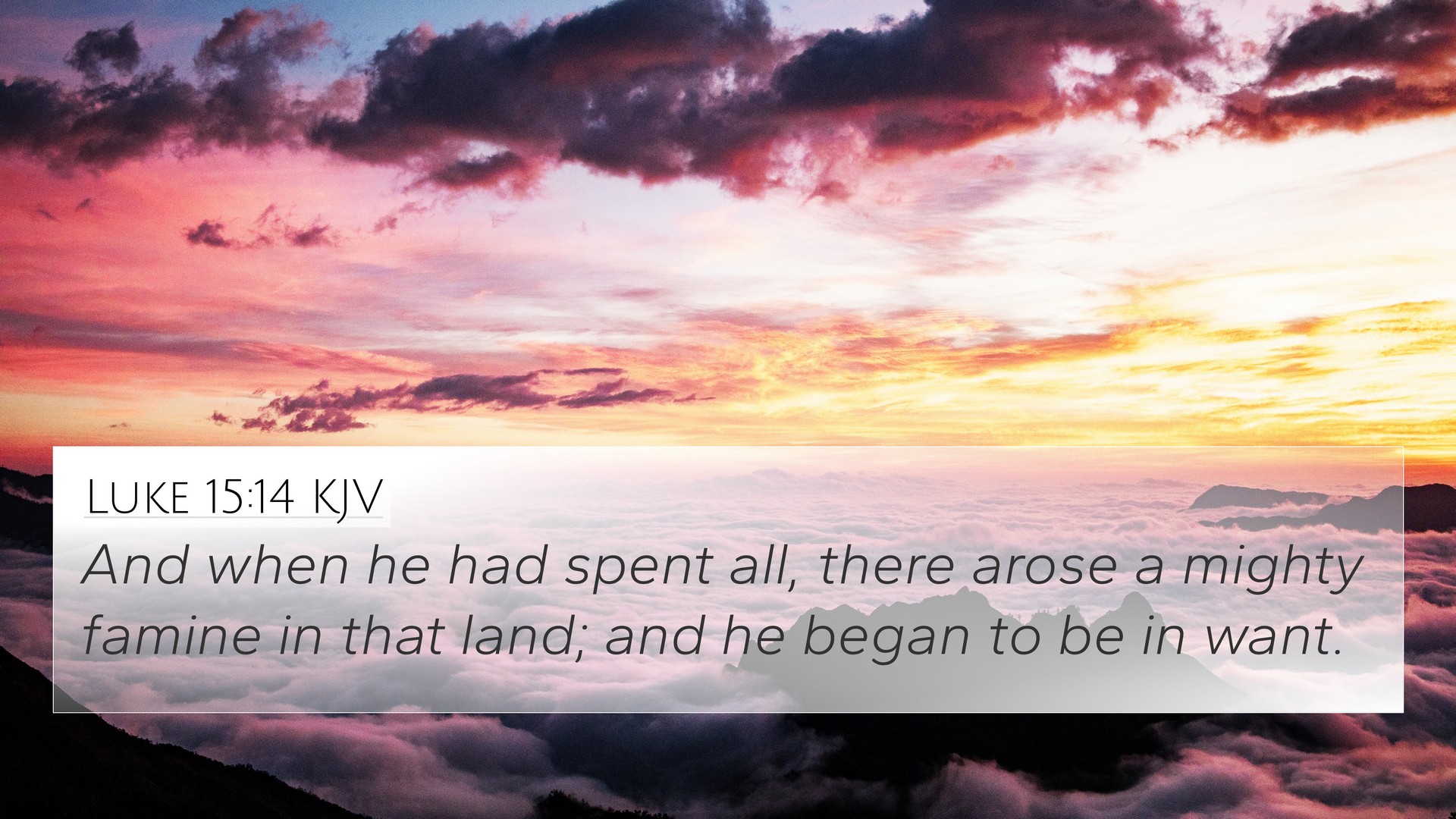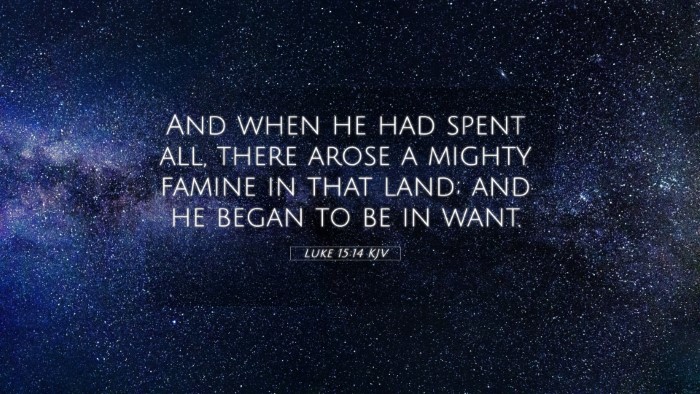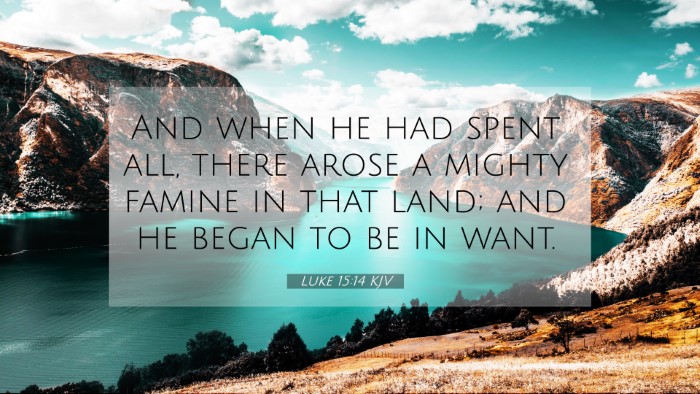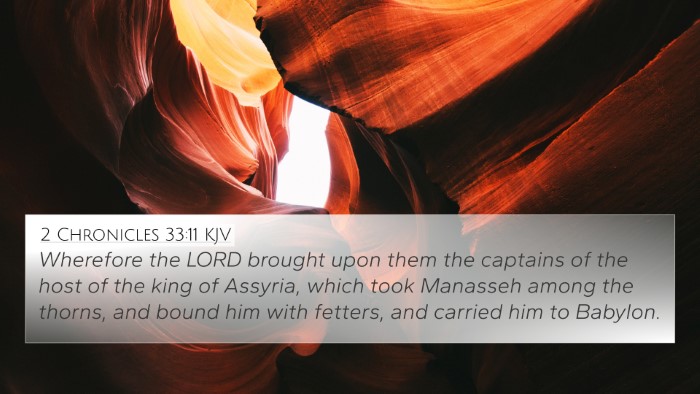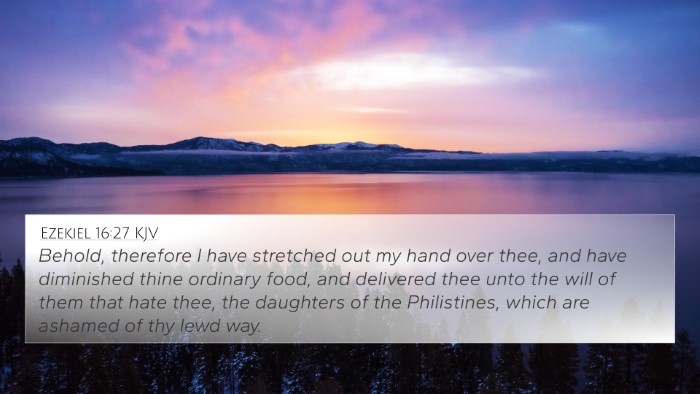Understanding Luke 15:14
Luke 15:14: "And when he had spent all, there arose a mighty famine in that land; and he began to be in want."
This verse is part of the Parable of the Prodigal Son, which illustrates themes of repentance, grace, and the nature of God’s forgiveness through a vivid story.
Verse Analysis
In this verse, we see the consequences of the younger son’s choices as he squanders his inheritance. As he spends his wealth, famine strikes the land, reflecting a broader truth about the fleeting nature of material possessions and the ultimate emptiness of living for self-gratification.
Insights from Public Domain Commentaries
-
Matthew Henry:
Henry emphasizes the sad realization that the son faces when he exhausts all his resources. The famine represents not just a physical scarcity but a spiritual one, illustrating how greed and self-indulgence can lead to dire situations.
-
Albert Barnes:
Barnes points out that the famine serves as a pivotal moment in the son’s journey—where he transitions from having everything to losing it all. This highlights the mercy of God, who waits for the sinner to recognize their need for repentance.
-
Adam Clarke:
Clarke notes that this verse underlines the internal conflict and the deep want that the son experiences. This realization sets the stage for his eventual return to the father, symbolizing the hope of redemption.
Key Themes
The core themes reflected in Luke 15:14 include:
- Consequences of Sin: The son’s reckless living leads to a deeper want.
- The Nature of Grace: God's grace is evident in the son's eventual return.
- Repentance: Recognition of need prepares the way for turning back to God.
Bible Verse Cross-References
To fully comprehend Luke 15:14, it’s useful to explore verses that connect thematically and contextually:
- Proverbs 21:17: "He who loves pleasure will be a poor man; he who loves wine and oil will not be rich."
- Galatians 6:7: "Do not be deceived: God is not mocked, for whatever one sows, that will he also reap."
- Ecclesiastes 5:10: "He who loves silver will not be satisfied with silver; nor he who loves abundance with increase. This also is vanity."
- James 4:2: "You desire and do not have; you murder and covet and cannot obtain. You fight and quarrel. You do not have because you do not ask."
- Luke 15:17: "But when he came to himself, he said, ‘How many of my father’s hired servants have more than enough bread, but I perish here with hunger!'”
- Isaiah 55:2: "Why do you spend your money for that which is not bread, and your labor for that which does not satisfy?"
- Romans 2:4: "Or do you show contempt for the riches of his kindness, tolerance, and patience, not realizing that God’s kindness is intended to lead you to repentance?"
Connecting Themes Through Comparative Analysis
Understanding Luke 15:14 involves connecting it with other relevant scriptures that depict similar themes of loss, repentance, and redemption:
- Similarities with the Book of Ruth: Ruth's journey reflects themes of loss and returning to a place of safety and provision, paralleling the Prodigal Son’s return to the father.
- Connection to Psalm 32:5: The confession and forgiveness illustrated in this Psalm mirrors the son’s eventual acknowledgment of his sins.
- Themes in 2 Corinthians 7:10: The relationship between godly sorrow and repentance is echoed in the son’s journey in Luke 15.
The Importance of Cross-Referencing
Cross-referencing Bible verses can deepen understanding and provide greater context to individual verses. Here are some tools and concepts to utilize:
- Bible Concordance: Essential for locating specific words and themes across scripture.
- Bible Cross-Reference Guide: A helpful resource for seeing related verses that enrich biblical narratives.
- How to Use Bible Cross-References: Examine similar themes across the Bible to enrich understanding.
- Bible Chain References: Follow a chain of verses that relate to a central theme or narrative.
Conclusion
Luke 15:14 serves as a critical moment in the Parable of the Prodigal Son, with rich implications regarding human folly and divine grace. Through the insights gained from public domain commentaries and an examination of related scriptures, readers can appreciate the depth of this passage. Engaging in cross-referencing allows for a more holistic understanding of biblical themes and encourages a deeper spiritual introspection.
